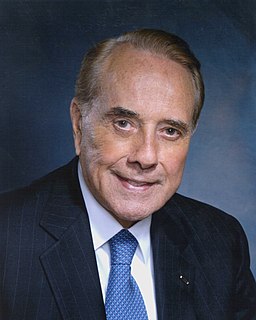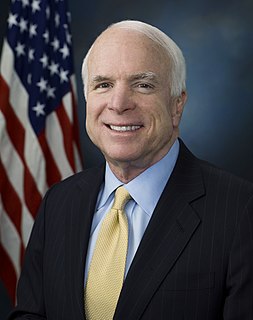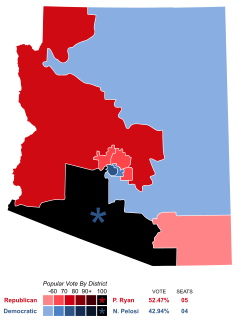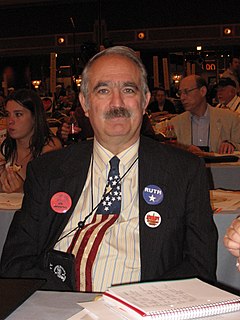
Samuel Pearson Goddard III is an American attorney and politician. A member of the Democratic Party, he served as the Mayor of Phoenix from 1984 to 1990, on the Central Arizona Water Conservation District from 2001 to 2003 and as the 24th Attorney General of Arizona from 2003 to 2011.

The New York gubernatorial election of 2010 was held on Tuesday, November 2, 2010. Incumbent Democratic Governor David Paterson, elected as Lieutenant Governor in 2006 as the running mate of Eliot Spitzer, chose not to run for a full term. Democratic New York Attorney General Andrew Cuomo defeated Republican Carl Paladino to become the next Governor of New York.

The 2010 South Carolina gubernatorial election took place on November 2, 2010. Incumbent Republican Governor Mark Sanford was term limited and unable to seek re-election. Primary elections took place on June 8, 2010 and a runoff election, as was necessary on the Republican side, was held two weeks later on June 22.

United States gubernatorial elections were held on November 2, 2010 in 37 states and two territories. As in most midterm elections, the party controlling the White House lost ground. Democrats did take five governorships from the Republicans, and Republicans took 11 governorships from the Democrats. An independent won one governorship previously held by a Republican. A Republican won one governorship previously held by an independent. Republicans held a majority of governorships for the first time since before the 2006 elections. One state, Louisiana, had no election for governor, but did feature a special election for lieutenant governor.

Ken Bennett is an American Republican politician and businessman who served as president of the Arizona Senate, and served as the 19th Secretary of State of Arizona, from 2009 to 2015. He was a candidate for Governor of Arizona in the 2018 election.

The 1996 Republican presidential primaries were the selection process by which voters of the Republican Party chose its nominee for President of the United States in the 1996 U.S. presidential election. Former Senator Bob Dole of Kansas, former Senate Majority Leader was selected as the nominee through a series of primary elections and caucuses culminating in the 1996 Republican National Convention held from August 12 to August 15, 1996, in San Diego, California.

The 2000 Republican presidential primaries were the selection process by which voters of the Republican Party chose its nominee for President of the United States in the 2000 U.S. presidential election. Texas Governor George W. Bush was selected as the nominee through a series of primary elections and caucuses culminating in the 2000 Republican National Convention held from July 31 to August 3, 2000, in Philadelphia, Pennsylvania.

The 2010 United States Senate election in Arizona took place on November 2, 2010, along with other elections to the United States Senate in other states as well as elections to the United States House of Representatives and various state and local elections. The primaries were held on August 24, 2010. Incumbent Republican U.S. Senator John McCain, who returned to the Senate after losing the presidency to then-Illinois Senator Barack Obama in the 2008 presidential election, ran for reelection to a fifth term and won.

The 2008 United States presidential election in Arizona took place on November 4, 2008, and was part of the 2008 United States presidential election. Voters chose 10 representatives, or electors to the Electoral College, who voted for president and vice president.

The Arizona gubernatorial election of 2010 was held on November 2, 2010 to elect the Governor of Arizona. Incumbent Republican Jan Brewer ran for a full term. Party primaries were held on August 24, 2010. Jan Brewer won a full term, defeating Attorney General Goddard 54% to 42%.

The 2010 congressional elections in Arizona was held on November 2, 2010, to determine who will represent the state of Arizona in the United States House of Representatives. Arizona has eight seats in the House, apportioned according to the 2000 United States Census. Representatives are elected for two-year terms; those elected will serve in the 112th Congress from January 3, 2011 until January 3, 2013.

The 2012 United States Senate election in Arizona was held November 6, 2012, alongside a presidential election, other elections to the United States Senate in other states, as well as elections to the United States House of Representatives and various state and local elections. Incumbent Republican U.S. Senator Jon Kyl, the Senate Minority Whip, decided to retire instead of running for reelection to a fourth term. Republican U.S. Representative Jeff Flake won the open seat. As of 2019, this is the last election in which Republicans have won the Class 1 Senate Seat in Arizona.

The 2012 United States House of Representatives elections in Arizona were held on Tuesday, November 6, 2012, to elect the nine U.S. Representatives from the state, one from each of the state's nine Congressional districts, including the newly created 9th district following the 2010 United States Census. The elections coincided with other federal and state elections, including a quadrennial presidential election, and a U.S. Senate election. Primary elections were held on August 28, 2012.

The 2012 United States presidential election in Arizona took place on November 6, 2012, as part of the 2012 General Election in which all 50 states plus The District of Columbia participated. Arizona has been won by the Republican nominee for president in every election since 1952 except when President Clinton narrowly carried the state in 1996. No Democrat has won a majority in the state since Harry Truman in 1948. Arizona voters chose 11 electors to represent them in the Electoral College via a popular vote pitting incumbent Democratic President Barack Obama and his running mate, Vice President Joe Biden, against Republican challenger and former Massachusetts Governor Mitt Romney and his running mate, Congressman Paul Ryan. Prior to the election, all 17 news organizations considered this a state Romney would win, or otherwise considered as a safe red state. Arizona was won by Romney with a 9.03% margin.

The 2014 Arizona gubernatorial election was held on November 4, 2014, to elect the Governor of Arizona, concurrently with elections to the United States Senate in other states and elections to the United States House of Representatives and various state and local elections.

The 2016 United States Senate election in Arizona was held on November 8, 2016, to elect a member of the U.S. Senate to represent the State of Arizona, concurrently with the 2016 U.S. presidential election, as well as other elections to the Senate in other states and elections to the U.S. House of Representatives and various state and local elections.

The 2016 United States House of Representatives elections in Arizona were held on November 8, 2016, to elect the nine U.S. Representatives from the state of Arizona, one from each of the state's nine congressional districts. The elections coincided with the 2016 U.S. presidential election, as well as other elections to the House of Representatives, elections to the United States Senate and various state and local elections. The primaries were held on August 30.

The 2018 Arizona gubernatorial election took place on November 6, 2018, to elect the governor of Arizona, concurrently with the election of Arizona's Class I U.S. Senate seat, as well as other elections to the United States Senate in other states and elections to the United States House of Representatives and various state and local elections.

A general election was held in the U.S. state of Arizona on November 6, 2018. All of Arizona's executive offices were up for election as well as a United States Senate seat and all of Arizona's nine seats in the United States House of Representatives. The Democratic Party picked up three statewide offices, as well as a seat in the U.S. House.




























